When you explore the "Sons of Abraham," you find a rich family tapestry woven through both biological and spiritual lines. Abraham had eight children, with Isaac and Ishmael being the most significant. Isaac, as the "child of promise," inherited God's covenant, while Ishmael became the father of various Arab tribes. Keturah, Abraham's second wife, also bore six children, forming additional clans. This lineage isn't just about descent; it highlights a broader spiritual heritage that transcends mere blood ties. If you stay with us, you'll uncover how these relationships shaped cultures and faiths throughout history.
Key Takeaways
- Abraham had eight children: Ishmael, Isaac, Zimran, Jokshan, Medan, Midian, Ishbak, and Shuah.
- Ishmael, born to Hagar, is the firstborn, while Isaac is the child of promise born to Sarah.
- Keturah, Abraham's second wife, mothered six children who founded various tribes, including the Midianites.
- Isaac's descendants inherit God's covenant promises, while Ishmael and Keturah's children are excluded from this covenant.
- Abraham's legacy includes diverse lineages that shaped religious and cultural traditions, impacting both Israelites and various Arab tribes.
Introduction

Abraham, a pivotal figure in religious history, is often referred to as the father of many nations. You might find it fascinating that he'd a total of eight filhos. His first son, Ishmael, was born through Hagar, while Isaac, the child of promise, came from his wife Sarah. This promise, established through a covenant with God, set Isaac apart as Abraham's "only son" in a theological sense.
After Sarah's death, Abraham married Keturah and had six more children: Zimran, Jokshan, Medan, Midian, Ishbak, and Shuah. Each of these filhos contributed to the rich tapestry of Abraham's lineage.
Although Ishmael wasn't the child of promise, God blessed him, and he became the ancestor of a great nation, as highlighted in Genesis.
The descendants of Keturah's children went on to form various tribes, including the Midianites, showcasing the extensive and diverse heritage stemming from Abraão.
This multitude of offspring emphasizes the profound impact of Abraham's life and the enduring significance of the promises made to him. The legacy of these filhos continues to resonate across generations and cultures.
Biblical Lineage of Abraham's Children
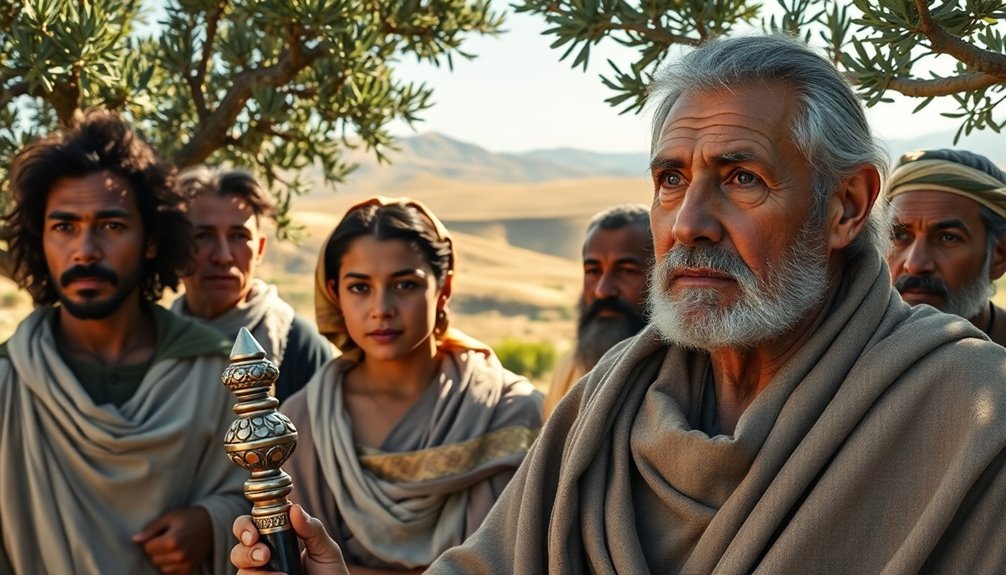
Now that you've got an overview of Abraham's family, it's essential to look at the Biblical references that outline his lineage.
Primary sources like Genesis provide detailed accounts of his children, while secondary references help clarify their significance.
Understanding these connections deepens your insight into the legacy of Abraham's descendants.
Primary Bible References
The biblical lineage of Abraham's children is a fascinating tapestry that reveals the diverse roles each played in the unfolding narrative of faith. Abraham had eight children, with Ishmael and Isaac being the most notable. Ishmael was born to Hagar when Abraham was 86 years old, while Isaac, the child of promise, was born to Sarah when Abraham was 100 (Genesis 16:1-4; 21:1-3).
Isaac is often referred to as Abraham's "only son" in relation to the covenant, emphasizing his unique status in the context of God's promises (Genesis 22:2; Galatians 4:22).
Following Isaac, Abraham had six additional children with Keturah: Zimran, Jokshan, Medan, Midian, Ishbak, and Shuah (Genesis 25:1-6). The descendants of Ishmael became known as the Ishmaelites, while Isaac's lineage continued through Jacob, who was later named Israel, forming the foundation of the Jewish nation (Genesis 25:12-16; 28:10-14).
Each of these filhos de Abraão contributes to a rich heritage that showcases God's ongoing work and the fulfillment of His promessa de Deus throughout generations.
Secondary Bible References
Abraham's legacy extends beyond his immediate family, influencing various nations and peoples through his children. His first son, Ishmael, born to Hagar at age 86, became the patriarch of the Ishmaelites, as noted in Genesis 16:1-4.
Then, at 100 years old, Abraham had Isaac, the child of promise, fulfilling a significant part of a aliança de Deus (Genesis 21:1-3). Isaac's lineage is critical, as he fathered Jacob, who established the twelve tribes of Israel, marking a profound biblical lineage from Abraham (Genesis 35:22-26).
After Sarah's passing, Abraham married Keturah, and together they'd six more children: Zimran, Jokshan, Medan, Midian, Ishbak, and Shuah (Genesis 25:1-6).
These filhos de Abraão contributed to various tribes, including the Midianites, further expanding his legacy. Each of these descendants plays a vital role in the narrative of the Bible, illustrating how Abraham's influence stretches across generations and territories.
The relationships and lineages formed through his children underscore the importance of Abraham in the biblical story and his enduring impact on faith and heritage.
Covenant Significance in Lineage
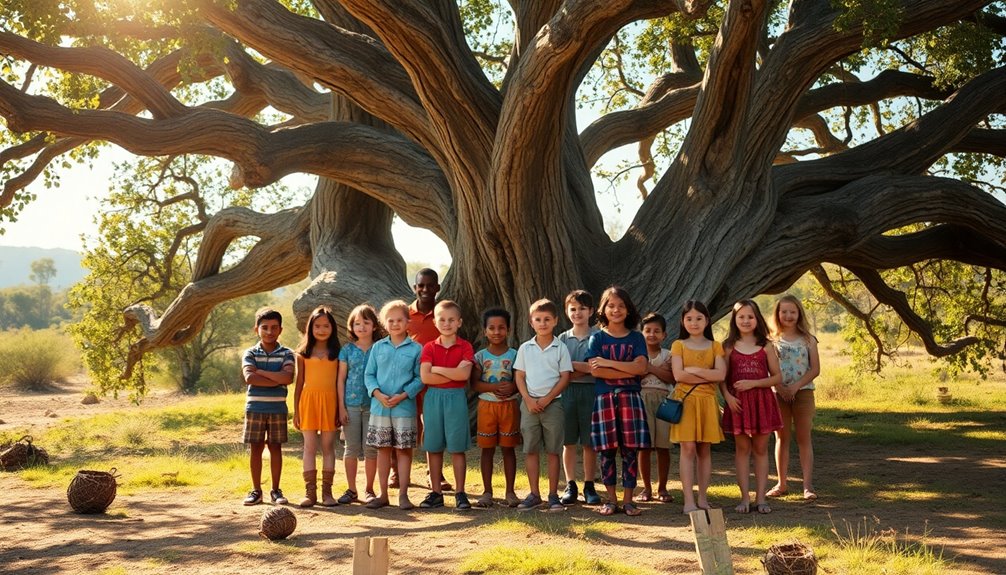
Covenant significance in lineage reveals how Isaac stands out as the sole heir to God's promises made to Abraham. While Abraham had eight children, only Isaac inherited the covenant promises, emphasizing his unique position as the child of promise.
The distinction between Isaac and the other children, born from concubines, highlights the importance of the divine alliance de Deus established with Abraham. In Genesis 22:2, God refers to Isaac as Abraham's "only son," underscoring the significance of this covenantal relationship.
The descendants of Isaac formed the Israelite nation, central to God's covenant relationship, while the children of Keturah, though blessed, weren't part of this specific promise. This lineage illustrates that not all filhos de Abraão are included in the covenant.
The true essence of being a filho de Abraão extends beyond physical descent; it encompasses faith. As Galatians 3:7 states, all believers are considered verdadeiros filhos de Abraão through their faith, linking them to the promises and blessings of the covenant.
Thus, the significance of the covenant transcends mere lineage, inviting all who believe into this divine legacy.
Covenantal Relationships Defined Lineage

Understanding how covenantal relationships define lineage is crucial to grasping the dynamics of God's promises. When God made a covenant with Abraham, He established Isaac as the primary heir, reinforcing Isaac's unique role in the lineage da promessa (Genesis 21:12). This covenant included a promise of abundant descendants, which was realized through Isaac and later generations (Genesis 15:5).
Although Ishmael was Abraham's firstborn, he wasn't included in the covenant promise, highlighting a specific divine choice regarding lineage (Genesis 17:20). Similarly, Abraham's marriage to Keturah produced six additional children, yet they too were excluded from the covenant lineage, further emphasizing Isaac's significance (Genesis 25:1-6).
In the New Testament, the concept of filhos de Abraão expands beyond physical lineage. It emphasizes that true descendants of Abraham are defined by faith, aligning spiritual inheritance with God's covenant (Galatians 3:7-9).
Therefore, understanding these covenantal relationships helps you see how God's promises shape the identity of His people, connecting them to the rich history and purpose found in the family of Abraham.
Misunderstanding Abraham's Family Tree
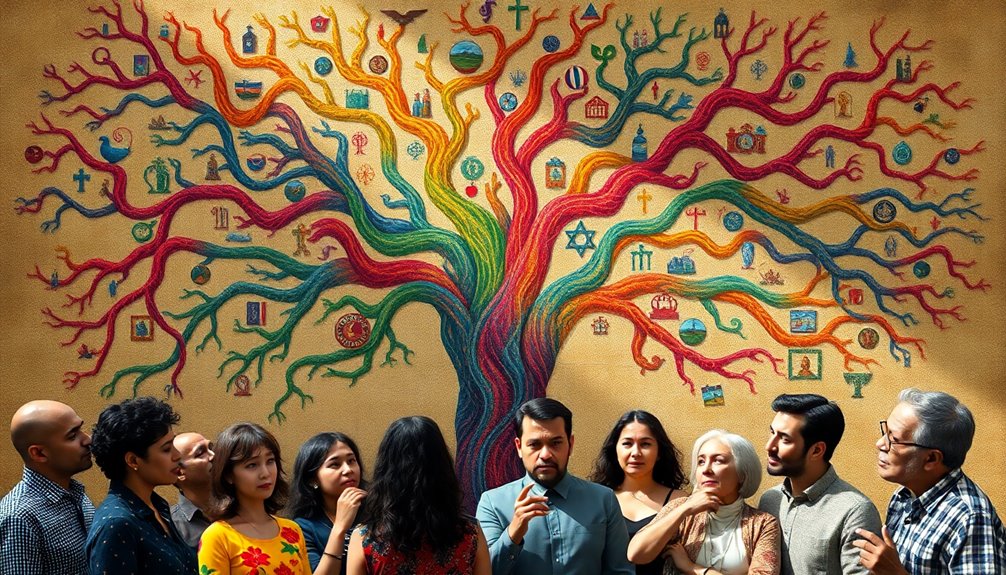
When you look at Abraham's family tree, it's easy to get confused.
Most people focus solely on Isaac, forgetting his other children, like Ishmael and the six from Keturah.
Understanding this broader picture helps clarify the complexities of Abraham's lineage and the covenant promises tied to it.
Debunk Family Tree Confusion
Abraham's family tree can be quite perplexing, especially with all the mention of his various children. You might hear about his filhos de Abraão, which include Ishmael and Isaac, but there's more to the story.
Ishmael, born to Hagar, is often recognized as Abraham's firstborn. Although he was blessed by God and became the father of twelve princes, he isn't part of the covenant promise. That distinction belongs to Isaac, born through Sarah.
Isaac is frequently referred to as Abraham's "only son" because he's the child of promise, setting him apart from Ishmael and the other sons. After Sarah passed away, Abraham had six more children with Keturah: Zimran, Jokshan, Medan, Midian, Ishbak, and Shuah.
However, these children, like Ishmael, don't figure into the covenant lineage, which remains focused on Isaac and his descendants.
Understanding this hierarchy is crucial. The biblical narrative underscores that the spiritual lineage of Abraham extends beyond biological ties, emphasizing faith rather than mere ancestry.
Thus, while Abraham had many children, only Isaac fits within the covenant's framework, shaping the foundation for future generations.
Confusion Over Lineage Interpretations
Confusion often arises around the lineage interpretations of Abraham's family tree, largely due to the varying roles and significance attributed to each of his children in biblical narratives. While you might think of Isaac as the central figure, the truth is that Abraham had a total of eight filhos de Abraão, including Ishmael and six others with Keturah.
The Bible refers to Isaque foi o único son in the context of the covenant, emphasizing his unique status as the child of promise. This designation can lead to misunderstandings about Ishmael and Keturah's children, who are often overlooked.
In the New Testament, the distinction between Isaac and Ishmael further complicates matters. Ishmael symbolizes bondage, while Isaac represents freedom, contributing to a narrow view of Abraham's lineage.
Moreover, many forget that true descendants of Abraham aren't just defined by physical lineage but by the fé de that underpins their beliefs. This spiritual interpretation adds another layer of confusion, as you navigate the complexities of Abraham's family tree.
Understanding both the literal and spiritual aspects can help clarify the significance of each figure in this rich biblical history.
Family Dynamics in Faith
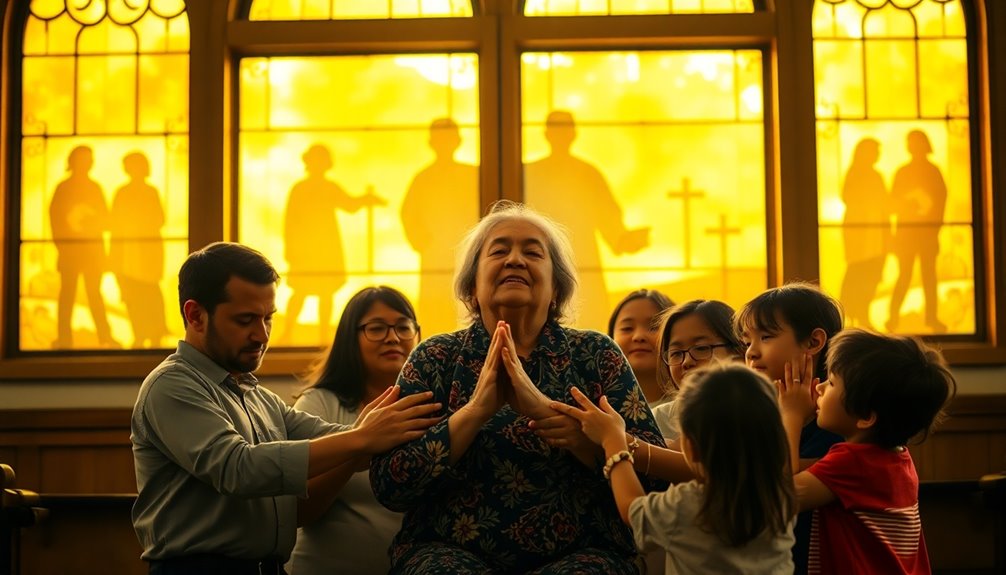
When you think about faith in familial relationships, consider how Abraham's story highlights the complexities of trust and promise.
Family gatherings can become powerful moments for sharing beliefs and nurturing spiritual connections, reflecting the legacy of faith passed through generations.
Faith in Familial Relationships
Familial relationships are deeply influenced by faith, as seen in the narrative of Abraham and his descendants. Abraham's unwavering fé shaped his family dynamics, particularly when he accepted God's promise of countless descendants despite his and Sarah's advanced age, resulting in Isaac, the child of promise. This pivotal moment illustrates how faith can redefine your expectations and deepen your connections.
However, not all was harmonious. Sarah's jealousy over Hagar and Ishmael led to their expulsion, highlighting the challenges faith can present within familial relations. Yet, God's provision for Hagar and her son emphasizes that navigating conflicts with faith is essential.
Isaac's role as the favored son reinforces how divine promises can elevate certain family members while shaping legacies. Later, Abraham's marriage to Keturah and the birth of more children demonstrate that faith extends beyond immediate relationships, as these new tribes contributed to God's broader narrative.
Ultimately, the New Testament reminds us that true familial ties in faith transcend biological lineage, identifying all believers as filhos de Abraão, making you part of the legacy of the pai de muitas nações. Your faith connects you to a spiritual family, enriching your relationships. Recognizing emotional intelligence within these dynamics helps cultivate stronger bonds among believers.
Faith-Based Family Gatherings
Unity is often at the heart of faith-based family gatherings, where shared beliefs and values create a strong sense of community among relatives. Just as the filhos de Abraão were called to uphold the fé and the alianças made with God, these gatherings serve to reinforce that connection.
You gather to share stories and testimonies, celebrating your spiritual heritage rooted in the biblical narrative of Abraham and his descendants.
Prayer and worship become central activities, mirroring Abraham's practices as he built altars and called on the Lord. This shared devotion strengthens your family's spiritual bond and reminds everyone of their purpose as descendants of a great patriarch.
Celebrating religious milestones and traditions allows you to connect deeply with your ancestry, echoing the call to be a blessing to all nations.
Additionally, engaging in service projects during these gatherings promotes collective action in faith, emphasizing the importance of living out the covenant relationship with God.
As you come together, you embody the spirit of the filhos de Abraão, nurturing a legacy of faith that can inspire future generations.
Abraham's Legacy Through Lineage
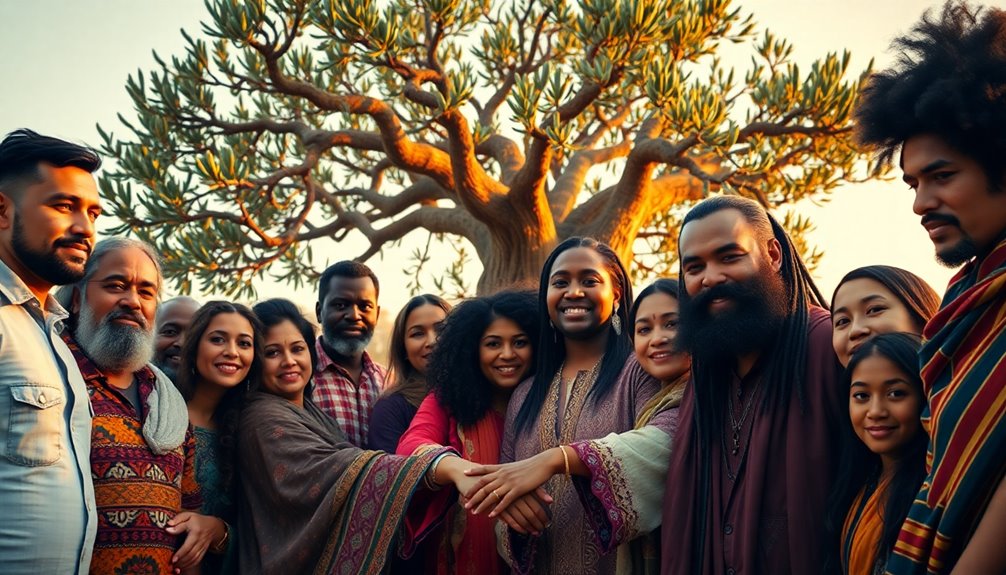
Abraham's legacy is intricately woven through his diverse lineage, comprising eight children from different mothers. Among his filhos de Abraão, Isaac stands out as the child of promise, the true herdeiro of God's covenant—his lineage laid the groundwork for the Israelite nation.
While Ishmael, born to Hagar, and the six children from Keturah—Zimran, Jokshan, Medan, Midian, Ishbak, and Shuah—received blessings, they didn't inherit the covenant promise. Ishmael's descendants became known as the Ishmaelites, linking him to various Arab tribes.
Keturah's offspring established clans that settled in regions tied to Syria and Arabia, particularly known as the Midianites. This rich tapestry highlights how Abraham's influence spread across nations and cultures, even beyond those who directly inherited the promise.
Isaac's lineage continued through Jacob, who transformed into Israel, furthering the legacy of the alianza initiated with Abraham. This dynamic heritage illustrates not only the multifaceted nature of Abraham's descendants but also the significant impact they'd on history and faith, shaping the religious and cultural landscapes we know today.
Additional Resources
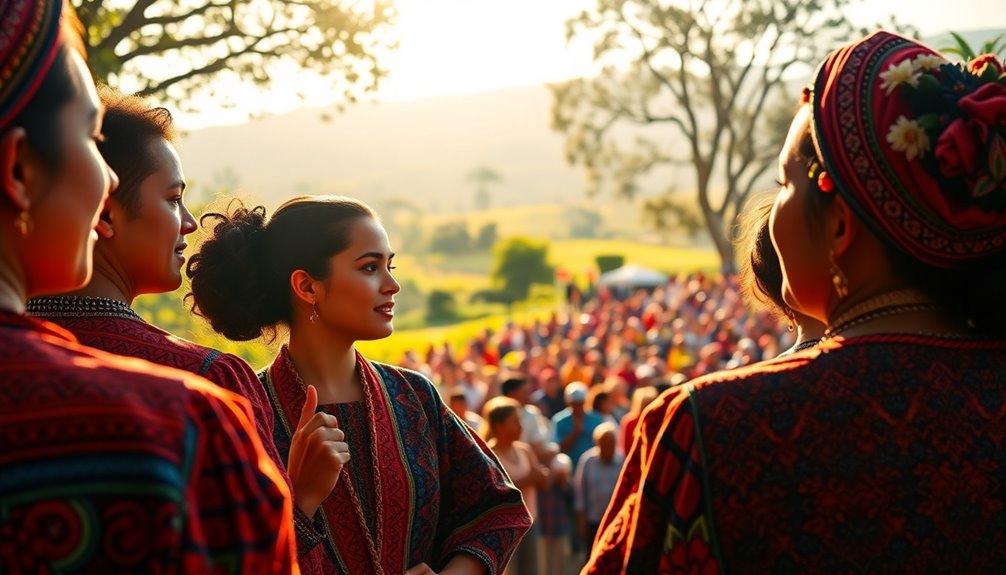
To deepen your understanding of the complex lineage stemming from Abraham, a variety of resources are available that explore both historical and theological perspectives.
You can start by reading biblical texts that detail the lives of the filhos de Abraão, highlighting key figures like Ismael and Isaque. Genesis provides rich narratives that clarify the distinctions between these sons and their roles in the covenant promise.
Consider engaging with scholarly articles that analyze the implications of Abraham's relationships and the significance of the children born to him. You'll find that Ismael, born to Hagar, is often viewed through the lens of his status outside the covenant, while Isaque, born to Sarah, is recognized as the child of promise.
Additionally, historical commentaries can offer insights into the tribes formed from the descendants of Keturah's children, such as the Midianites, enriching your perception of the broader impact of Abraham's lineage.
Documentaries and lectures can also provide visual and narrative context, making these biblical stories more relatable. By exploring these resources, you'll gain a comprehensive understanding of the complexities surrounding the filhos de Abraão and their enduring legacies.
Frequently Asked Questions
Who Are the Children of Abraham in the Bible?
In the Bible, Abraham has eight children.
You'll find Ishmael, born to Hagar, and Isaac, born to Sarah.
Later, after Sarah's death, he'd six more with Keturah: Zimran, Jokshan, Medan, Midian, Ishbak, and Shuah.
Ishmael is seen as the father of a great nation, while Isaac inherits God's covenant.
Each child's lineage plays a significant role in biblical history, shaping the narratives of various nations.
What Happened to the Children of Abraham and Keturah?
After Abraham married Keturah, you'd find that he'd six children with her: Zimran, Jokshan, Medan, Midian, Ishbak, and Shuah.
Though he blessed them, you'll see that Abraham sent them away to the east to ensure Isaac remained the primary heir of God's covenant promise.
Their descendants became associated with various tribes, including the Midianites, contributing to the region's diversity, but they didn't inherit the covenant blessings meant for Isaac.
How Many Children Did Abraham Have in Total?
Abraham had a total of eight children.
He'd Ishmael with Hagar when he was 86 and Isaac with Sarah when he was 100.
After Sarah passed away, he married Keturah, who bore him six more children: Zimran, Jokshan, Medan, Midian, Ishbak, and Shuah.
Although he'd multiple sons, Isaac is often seen as his "only son" in the context of God's covenant promise.
Who Was the Son of Abraham and Sarah?
The son of Abraham and Sarah is Isaac. When you think about Isaac, remember that he was born when Abraham was 100 years old, a fulfillment of God's promise despite their old age.
His name means "laughter," reflecting Sarah's initial disbelief at the prospect of motherhood.
Isaac's unique status as Abraham's "only son" highlights his important role in God's covenant, passing on the promise to future generations.










